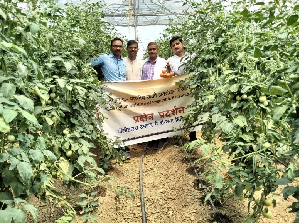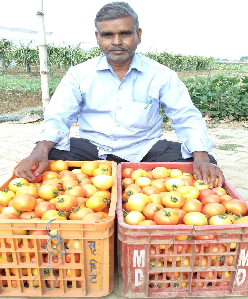Tomato, a high-value vegetable crop, holds immense nutritional and economic importance. While protected cultivation through polyhouses offers advantages such as off-season production and superior quality, adoption in northern India remains limited due to high setup costs, weak market linkages, and lack of technical know-how.
Shri Babulal Maurya, a progressive farmer from Robertsganj, Sonbhadra, faced similar challenges despite owning a 500 m² naturally ventilated polyhouse. Unsatisfied with the outcomes of his tomato cultivation, he approached ICAR-Indian Institute of Vegetable Research, Varanasi, for technical support.

During his visit to ICAR-IIVR, Shri Maurya underwent hands-on training on essential practices such as training and pruning techniques, drip irrigation, and the use of plant growth regulators to improve fruit set during high temperatures. He adopted the two-stem training system, standardized by ICAR-IIVR for indeterminate tomato varieties. This technique involves retaining the main stem and a single side shoot just below the first floral truss, promoting balanced growth, better light penetration, and increased productivity.
By following the recommended practices including 45 cm x 120 cm plant spacing and transplanting under drip irrigation in early March he successfully accommodated 640 plants in his polyhouse. Despite the high temperatures of May–June, traditionally considered suboptimal for polyhouse tomatoes, he continued cultivation and achieved 23.95 quintals of harvest over 20 pickings till early July, averaging 3.74 kg per plant.

With a total expenditure of ₹13,040 and gross returns of ₹59,875, Shri Maurya recorded a net profit of ₹46,835, along with superior fruit quality. His success story has motivated neighbouring farmers, many of whom have visited his farm and are now exploring protected cultivation.
Shri Maurya credits ICAR-IIVR for the transformative training and has expressed his commitment to continued adoption of scientific practices. His experience underscores the impact of timely technical interventions and knowledge transfer in enhancing yield and income under protected cultivation systems.
(Source: ICAR- Indian Institute of Vegetable Research, Varanasi)








Like on Facebook
Subscribe on Youtube
Follow on X X
Like on instagram